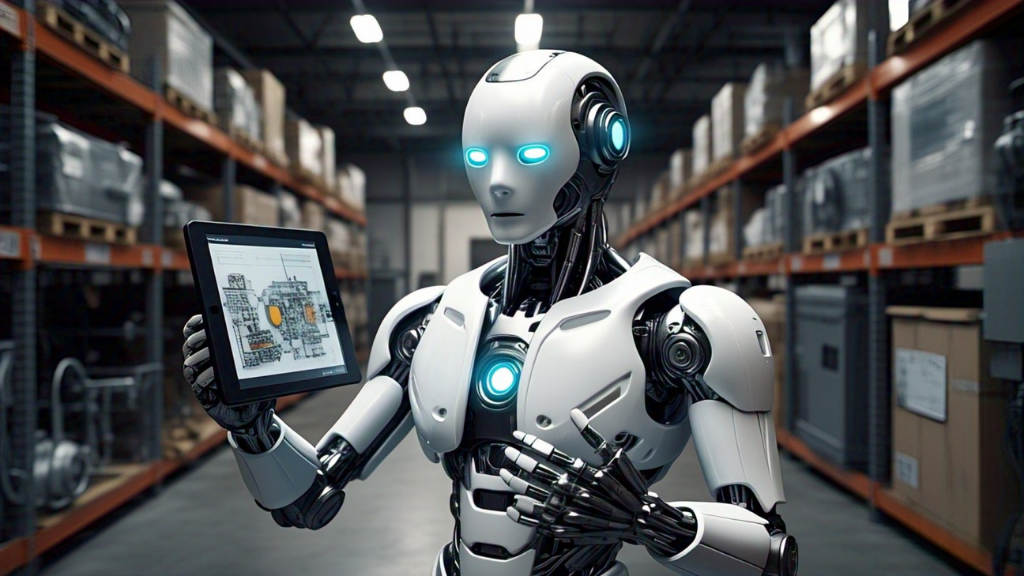Will Warehouses Be Operated by AI Agents in the Future?
In the wake of the AI revolution, warehouses — the backbone of supply chains — are standing on the edge of a monumental shift. From barcode scanners to robotics, we’ve already seen technology reshape warehouse operations. But the next leap? AI agents — intelligent systems capable of reasoning, learning, making decisions, and autonomously coordinating complex tasks.
The big question is: Will warehouses eventually be run by AI agents? If so, what does that mean for jobs, processes, and systems as we know them? Let’s unpack this vision of the future.
What Are AI Agents?
AI agents go beyond traditional automation. These are systems that can interpret data and environments in real time, make decisions and take action independently, learn and improve with experience, and coordinate with other agents or human teams. Think of them as virtual warehouse managers, supervisors, or floor operators who never sleep, constantly optimize, and learn from every task.
The Inevitable Evolution: Why AI Agents Make Sense
Warehouses are under pressure like never before — faster delivery promises, soaring SKUs, tight labor markets, and customer expectations for perfect accuracy. AI agents can offer transformative benefits:
- Real-time decision-making: Optimize routes for pickers or robots based on current order queue and aisle traffic.
- Adaptive slotting: Automatically rearrange inventory layout for faster picking as order trends shift.
- Returns processing: Decide whether an item should be restocked, refurbished, or discarded based on real-time product condition, value, and demand.
- Predictive maintenance: Alert human staff or robots for maintenance before a breakdown happens.
In short, AI agents bring proactive intelligence to every edge of the warehouse — from receiving docks to shipping bays.
Which Jobs Are at Risk?
While the term “job loss” often sparks fear, the story is more nuanced. Here’s a breakdown of how different roles may evolve:
- Repetitive, Rule-Based Tasks (High Risk):
Jobs that involve consistent, predictable processes are prime candidates for automation, such as data entry, manual quality checks, inventory counting, and basic pick-pack-ship workflows. - Middle Management & Supervisory Roles (Medium Risk):
AI agents can now monitor performance, analyze KPIs, and recommend staffing or slotting changes. Supervisory roles may evolve into tech-focused coordinators who oversee AI agents and interpret their outputs. - Creative Problem Solving & Human-Centric Tasks (Low Risk):
Roles requiring empathy, negotiation, or hands-on troubleshooting will persist — and even grow. These include vendor collaboration, process design, human resource management, training, and change management.
How Far Away Is This Future?
Some aspects of AI-driven warehousing are already here: robotics integrated with WMS, predictive analytics for demand forecasting, and vision-based AI for defect detection. But fully autonomous warehouses operated by AI agents — from inbound to outbound — will likely take 10–15 years to become mainstream, depending on the complexity of operations, investment appetite, and technological maturity. Adoption will likely follow a hybrid approach first: human-AI collaboration zones, gradually shifting to AI-first models in certain areas like micro-fulfillment centers or returns hubs.
What Needs to Change?
- People: Upskilling Over Replacement
The workforce must shift from manual operators to system supervisors, exception handlers, and AI trainers. Training will focus on AI literacy, human-machine collaboration, and data interpretation. - Processes: Dynamic and Data-Driven
SOPs will become flexible, algorithm-friendly flows that can adapt in real time. KPIs may shift from throughput to learning speed and AI-agent efficiency. - Technology: Open, Integrated, and Modular
Legacy systems won’t cut it. Future-ready warehouses will require real-time data streams, APIs, cloud-native infrastructure, and digital twins for simulation.
Conclusion: AI Agents Are Coming — But You’re Still in Control
The rise of AI agents in warehousing isn’t about replacing humans — it’s about reimagining how humans and intelligent systems work together. Businesses that embrace this shift early, invest in AI-aligned training, and adopt flexible systems will gain a competitive edge. In the not-so-distant future, your warehouse could be a place where AI agents dynamically orchestrate operations, while your people focus on creativity, strategy, and customer delight. It’s not science fiction — it’s just the next evolution in supply chain intelligence.

